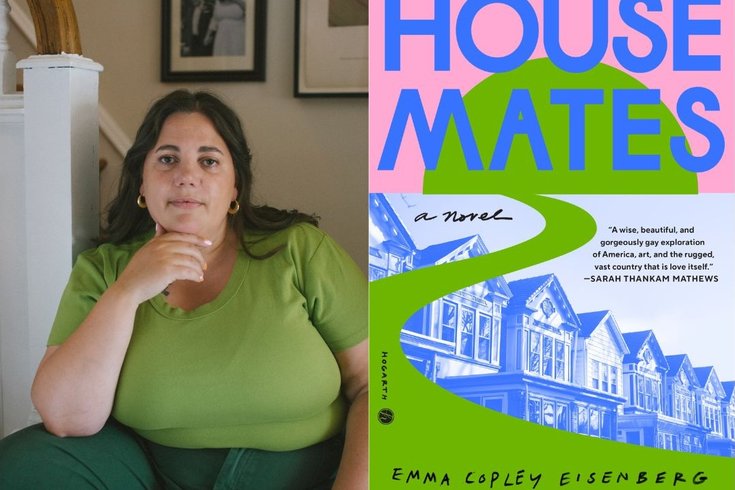
May 31, 2024
 Provided Images/Hogarth Books; Kenzi Crash
Provided Images/Hogarth Books; Kenzi Crash
Emma Copley Eisenberg's book "Housemates" tells the story of two queer artists living together in West Philly.
For her new novel, West Philly author Emma Copley Eisenberg found inspiration from photographer Berenice Abbott and her partner, Elizabeth McCausland, who, in 1935, before creating their most famous work, "Changing New York." took a cross-country trip, photographing Americans against the backdrop of the Great Depression.
"They both left for the road trip very single, honestly, and very adrift in both of their careers, and they came back romantically together and artistically very clear about the work that they wanted to make," Eisenberg said. "I was kind of like, 'Wow, what happened on that road trip?'"
Eisenberg might never know the answer to that, but she's able to create her own, modern version in her new novel "Housemates," which is out now. The novel tells the story of Bernie (named after Berenice) and Leah living in a queer group house in West Philly and is set in the years leading up to the pandemic and 2020 election. A few months after Bernie moves in, the pair decide to embark on a road trip through Central Pennsylvania, Bernie taking photos along the way and Leah writing the stories of their encounters.
Eisenberg, who moved to Philly in 2011, opted to set the book in near West Philly, with mentions of Fu-Wah Deli, Dahlak and the West Philly co-op. She said she wanted to explore the juxtaposition of the area's Black middle class that's getting pushed out by gentrification amidst an "exploding population of queer people trying to make their own world."
"West Philly has these incredible group houses," Eisenberg said. "I lived in a group house for a while and I just think they're micro-climates that are trying to make something beautiful and often do and often have a lot to say about the ways that people are trying to make their own world, almost like a utopia."
Eisenberg wrote non-fiction for her first book, "The Third Rainbow Girl," which is about a double murder in rural West Virginia. But she said writing fiction is her first love, and it allowed her the freedom to explore heavy topics while still having fun and bringing joy to her characters and readers.
"Housemates" digs in to the idea of artistic inheritance. Bernie and Leah's road trip takes them to the home of Bernie's former teacher, Daniel Dunn, who recently passed away amidst a reckoning of his history of sexual inappropriateness. Bernie, though, has to unravel the idea that she owes Dunn credit for teaching her large format photography, an unusual type of film shooting, while simultaneously wanting to sever all ties from him.
"I wanted to write a book that thought a lot about artistic education and both the pleasures and the risks that come from that," Eisenberg said. "When you're taught to make art by someone else, that's a really loaded and tender thing that I think we should take very seriously."
At the same time, the book also shows the good that can come from artistic collaboration in the way of Leah and Bernie working together on their project. Being an artist in America has become even more difficult in the past few years, Eisenberg said, and she hopes the book shows the power of the art community working together.
"There's so much beauty and life-giving potential in collaboration and in working with other people to make something beautiful," Eisenberg said. "The group house in West Philly is also an art project, in a way, so I'm poking loving fun at it, but I'm also appreciating all the ways that people do try to make community and that there's a lot of power and beauty to be found in artistic community."